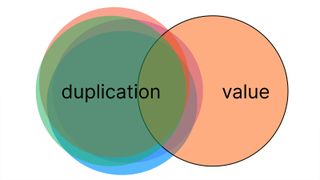The added value of (neuro)diversity
Posted onPeople like people who are like them. That's practical for making friends. It's not when you want a well-rounded team.

- A bit of background
- Diversity to the rescue
- What is diversity?
- Diversity is not a superpower
- (Personal) conclusion
A bit of background
There's this thing called "affinity bias". It's when people tend to like people who are a lot like them. It's one of a ton of biases that Wikipedia explains better than I do.
The thing with these biases is, they tend to cloud your judgment. This is especially clear when hiring (and promoting) people. People like people that are like them, so they're the ones that get hired and promoted. If this goes unchecked, you end up with teams full of people that are alike. Managements levels of people that are alike. Companies full of people that are alike. You gravitate towards echo chambers where everybody agrees, everybody says yes, and nobody offers a different perspective.
Diversity to the rescue
You can counter that with diversity. A person with a different background might spot new problems that would've been missed otherwise. A person with a different perspective might think of solutions that weren't thought of before.
Diversity brings creativity. Diversity brings awareness. Diversity brings experience. A diverse team has a much broader set of skills and is much more flexible!
It feels like such an obvious thing to be writing about, but that's probably the thing with biases. You're often not aware until somebody points them out. (And that's complicated, because if you're surrounded by people like you, maybe nobody will point it out.)
What is diversity?
There are so many angles to diversity, that trying to list them is probably a recipe for failure. I'll mention a few, but you'll probably know some groups of people that I don't. For example, you could be working with people all around the same age and are practicing ageism. But what about other traits? Think of gender, race or culture. The cultural one is one I've experienced personally and seems to be overlooked often. A group of people with the same cultural background (hi Reddit) often lacks diversity.
Another one is ableism. Are people with disabilities included? It makes it much easier to build inclusive products and have inclusivity on your road map, when you include people with disabilities in your process. "Nothing about us without us" is a popular slogan that goes beyond disability rights.
Neurodiversity
I'd like to mention Neurodiversity specifically. I'm not even sure how to define it, if there is even one definition that could cover it. Neurodiversity is a term for people with atypical traits. This often includes people who are autistic, people with ADHD, dyslexia and all kinds of factors that deviate from how people (and mostly their brains) typically are.
As neurodiverse people are often "wired differently", they can be very good at adding perspectives and insights to conversations. The challenge is to let them contribute.
If somebody would investigate the prevalence of neurodiversity among developers and designers, I'd expect it to be above average. They're some of the most focussed and creative people you'll ever meet. If somebody would investigate the prevalence of neurodiversity among managers, I'd expect it to be below average. Outliers don't get promoted.
Diversity is not a superpower
Reading this, and many other articles, you might think diversity is a gift. Like it's inherently beneficial to be diverse. It's not. As I said, diversity can keep you from being hired and/or promoted. You're up against a very common and subtle bias that reinforces itself. If studied, I wouldn't be surprised if it's a bias that's deeply ingrained in many organizations.
As a diverse person, you're an outsider by default. And you often have to work extra hard to integrate (as you're not welcome by default).
(Personal) conclusion
Being diverse is often no fun. I'm neurodiverse in 3 different ways, and no, they don't cancel each other out. In most situations, you start with a disadvantage.
I consider it as a great benefit though. As an accessibility consultant, it's very useful. My neurodiversity means I'm pretty much always able to give a new perspective, to add to a conversation and give a new angle. I'm good at throwing curveballs, if I had to say it more US-centric.
People hire me to add value. I'm very good at that. It's what I've been doing all my life. I'm an outlier trying to make the world better for outliers.
Got feedback? I bet you'd appreciate a group of accessibility experts. Share insights and grow together.
Join Discord!